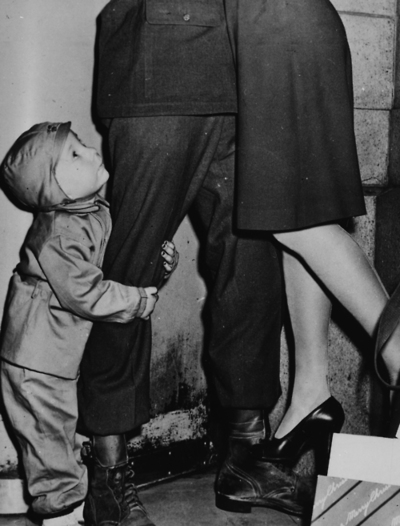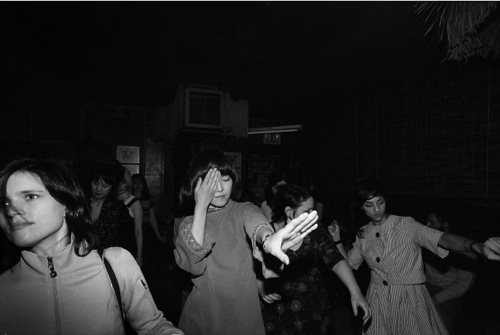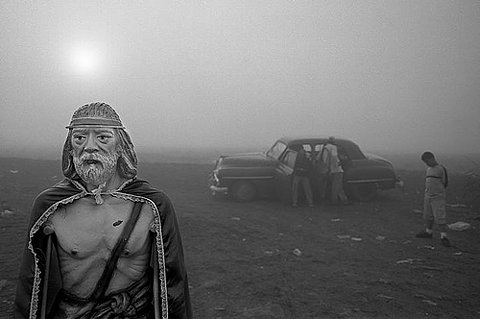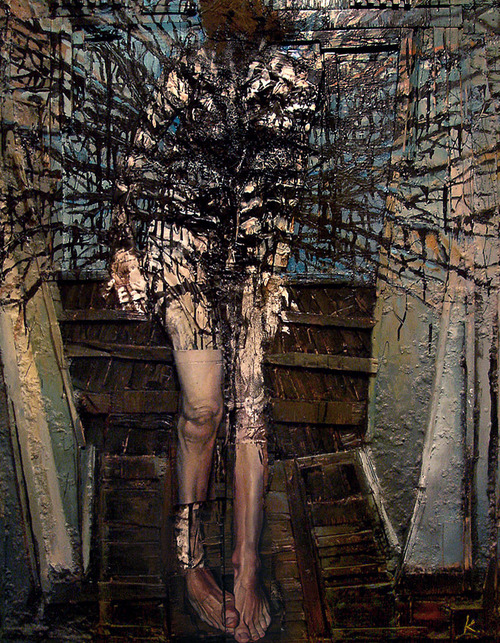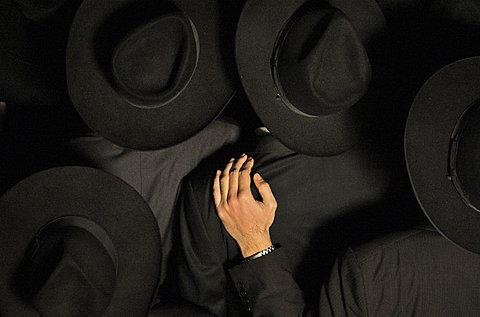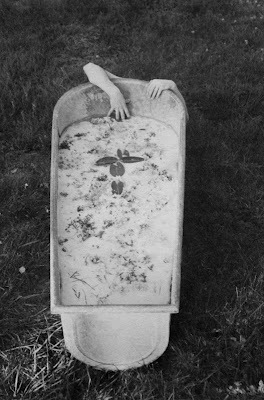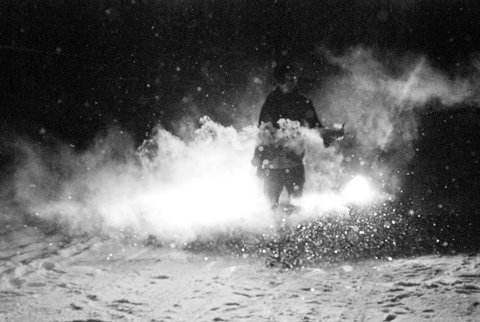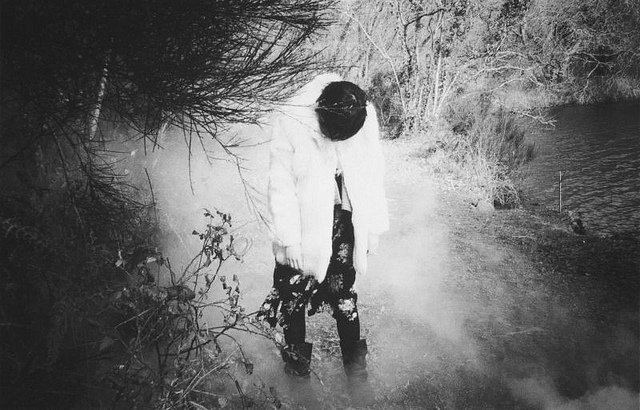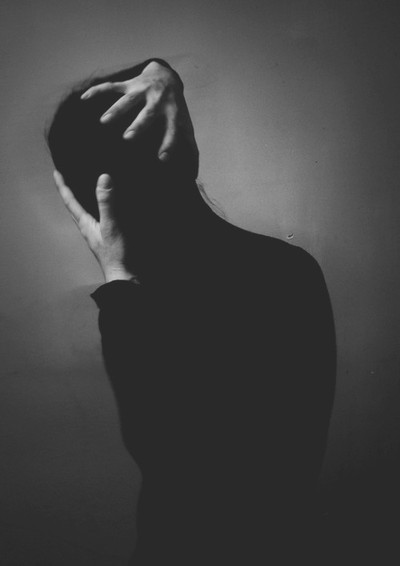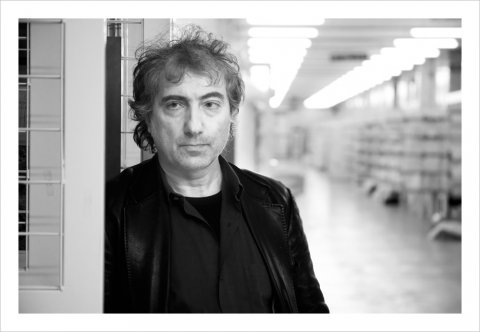
Winnicott by Adam Phillips (1988)
Analysis, like development, was about people taking their own time.
The development of a capacity to be surprised was the aim of analysis.
DW was intent on being understood rather than copied.
The anti-social act is a return to the point at which the environment failed the child.
What happened in the past can be known by being projected into the future as a fear.
What was registered unconsciously was an interruption, a blanking out, an absence in self-experience.
The way the mother holds the child in mind and body.
A child with a seriously depressed mother could feel infinitely dropped.
It was rather that children understood him.
The aim of any method was to produce new anomalies.
The symptom is a viable form of self cure.
It is not the symptom but the child’s use of symptoms that can be pathological.
With an ill child the symptoms aren’t doing their job.
The healthy child has a flexible repertoire of symptoms.
The details of a child’s life might be like beads waiting to be strung together.
The patient is always suffering from the self-knowledge he has to refuse himself. The analyst facilitates self-representation.
A tradition was only useful if it provided opportunities for innovation.
A change of language signals a change of belief.
Spontaneity comes out of early experiences of reliability.
The child needs to know the environment can withstand him.
Mouth love: the infant’s primitive, ruthless love.
How does a person grow from a state of primitive greed and absolute dependence on the mother to relative autonomy without too much loss of spontaneity, desire (without the false solution of rigid convictions or a strong leader)?
The infant’s attitude to food and use of appetite is a precursor of relationships with others and his own desire.
Winnicott is attentive to the kind of environment the child creates for himself, how he discovers and uses what he finds, as the essential indicator of emotional development.
Each interpretation is a glittering object designed to excite the patient’s greed.
The psyche (the imaginative elaboration of somatic parts, feelings and functions of physical aliveness) and the body have to find a shared language, to come to terms with each other, and this was the developmental process.
This co-ordination has three steps: integration, personalization, realization.
At the very beginning the infant is in a condition of primary unintegration. – unconnected feeling states without ego.
With one person (mother) to gather his bits together – the infant’s instinctual experience and repeated quiet experiences of body care (via mother) gradually build up a satisfactory personalization. There is a dawning sense of being a specific person whose particularity is rooted in his body.
Unintegration: trust in an environment where one can safely be in pieces without feelings of falling apart
Unintegration is a resource, disintegration is a terror.
A capacity for states of primary unintegration brought forward into later life is a developmental necessity.
We are poor indeed if we are only sane.
The risk is that we will impose a coherence on ourselves that can divorce us from our more primitive selves.
Developmental achievements are only achievements if they are reversible.
Fantasy is not a substitute for reality but the first method of finding it (the infant creates the breast out of her desire for it, the mother is an environment producing ‘sensitive adaptation’).

The infant can only tolerate, at first, being nourished by an object she appears to possess and control, so the mother fits in with her desire. Only this repeated experience gives her confidence in her desire as a source of possibility.
Analysis can be a setting that restores an environment for the first time.
The mother hates the infant (internalizing this feeling as masochism) for the child’s ruthless use of her in the service of her own development.
If the mother was depressed the mother uses the child to sustain something in herself.
Committed to growth, not the acquiring of convictions.
Playing is the process of finding through pleasure what interests you.
Language is always ventriloquism – speaking someone else’s words.
A secret can be found out, silence is invisible.
In the artist there is the urgent need to communicate and to hide. Not to be found.
The self is the player of hide and seek.
There were people who had experienced such severe failure of the early holding environment that they felt they had not started to exist. Their lives were characterized by a sense of futility born of compliance.
Before the mirror, the face of my mother.
If the infant is seen in a way that makes her feel she exists, she is free to keep on looking.
The child with an unresponsive mother – the mother whose face is frozen in a depressed mood – is forced to read the mood at the cost of her own feelings being recognized., This is a form of compliance, unable to get the mirror to notice and approve, the child is compelled to see only what the mother feels. And she has no way of knowing what, if anything, she has contributed to her mother’s mood.
Not to be seen by the mother is not to exist.
The false self has three functions: it attends within strict limitations to the mother, it hides and protects the True Self by complying with environmental demands, and it a caretaker, looking after the environment that has failed. It is a primitive form of self-sufficiency in the absence of nurture.
The True Self is a category for the idiosyncratic. The spontaneous gesture and personal idea.
Spontaneity: the cardinal virtue of the good life.
There is something pathological in the need to be believed.
On Kissing, Tickling and Being Bored by Adam Phillips (1993)
Curiosity is always opportunism.
A repertoire might be more useful than a conviction.
People have traditionally come to psychoanalysis conversation because the story they are telling themselves about their lives has stopped, or become too painful, or both.
A phobia protects a person from their own curiosity.
The phobia, which hoards the past, can be the one place in a person’s life where meaning apparently never changes; but this depends upon one never knowing what the meaning is.
The profoundest way of recognizing something is through hiding them from yourself.
Symptoms are a way of thinking about difficult things, thinking with the sound turned off.
The first world we find outside is, in part, a repository for the terror inside us, an elsewhere for those terrors and objects that bring us unpleasure. And that world we make outside is the world we need to get away from. It is the place, or one of the places, where we put the objects and desires we wish did not belong to us. To be at home in the world we need to keep it inhospitable.
The developmental question: what is unbearable about oneself and where is one going to put it?
What do we want most to dwell near to?
Only the impossible is addictive.
What constitutes a risk for us is an important clue as to what we value.
Ruthlessness gives way to ruth.
And creativity – what Winnicott later called creative living – involved the search for, and attempt to establish an idiom, an environment, a relationship that could survive the person’s most passionate destructiveness.
“I am in my work like a pit in its fruit.” Rilke (he becomes the seed of himself)
In the course of development, and apparently to different degrees, the body has to lose its overwhelming immediacy for the child, to become the child’s most paradoxical belonging. Composure would begin as the way the child responds, at least initially, to the intimated demand by the mother, in the face of the child’s desire for her, that the child alter the form of its self-presentation. An original clamour becomes a calculated social poise, a distinctive awkwardness that bears witness to the child’s struggle for acceptable forms of excitement, for ways in which he can be seen to be a desiring object without losing face.
Children are the people who can’t leave.
What is the unconscious problem that your belief solves for you, or the wishes that it satisfies?
In Freud’s terms we don’t believe, we wish; and above all we wish to believe.
Monotheism is linked to imperialism. It represents a triumph of the mind over the body.
It is as if the body produces and worships idols and the intellect produces the sublimated rigours of monotheism.
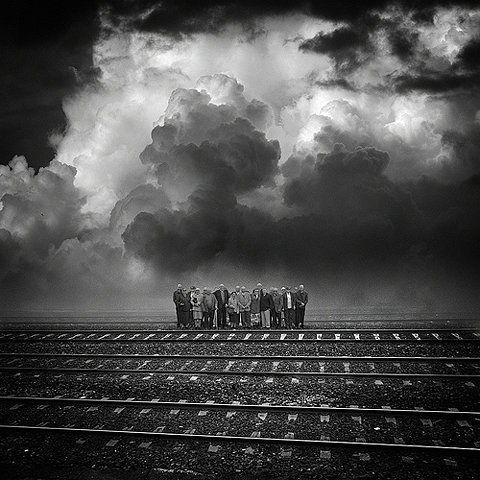
A symptom is always a state of conviction.
If I can think of it, it isn’t what I want. Randall Jarrett
We can be worried but we can’t be dreamed.
Worry can be punishments for wishes.
When we worry, what are we trying to eat?
Kissing: the mouth’s elegy to itself,
Perversion: knowing too exactly what one wants
Kissing involves some of the pleasures of nourishment in the absence of eating.
One’s real life is so often the life that one does not lead.
Each insight is the product of a specific blindness.
We are being perverse whenever we think we know beforehand exactly what we desire. To know beforehand is to assume that otherness, whether it be a person, a medium, an environment, is redundant, that it brings nothing.
To speak is always to be spoken for.
Waiting for an experience of anticipation.
Part of the fantasy of greed is to eat up one’s appetite.
It is difficult to enjoy people for whom we have waited too long.
The project of self knowledge is itself the problem, symptom masquerading as cure.
Belief is a form of cruelty.
The obstacle reminds me of what I want.
Satisfaction is the death of possibility.
Poor obstacles impoverish us.
The fluency of disorder, the inspirations of error.
Wittgenstein: What is the picture? How do we see the frame we bring to experience?
To know what one fears is to know what one wants.
To assent to our repertoire of fears.
On Flirtation by Adam Phillips (1994)
Flirtation is a form of skepticism.
The fascination of what is unconvincing.
States of conviction conceal the sense in which we are continually making our mind up.
People who are good at waiting may have nothing better to do.
No loss, no morality.
Definitions are sustained by exclusions.
Flirtation: the calculated production of uncertainty.
An adult is always a child who has failed.
A repertoire rather than a fate.
There is a history that our competence conceals.
Accidents are reminders that we are living too few of our lives.
Whatever is turned away from is marked as a danger to be faced or a loss to be mourned.
Judgment is fundamentally a question of whether something is edible.
Reading a book is a later version of feeding from the mother.
Repression (and all defense mechanisms) are ways of retaining things by getting rid of them.
The past, ghost-written as desire, is driving us into the future.
Memories become forms of forgetting.
The past is in the remaking.
Repetition is forgetting in its most spellbinding form.
Transference – this unwitting repetition of early relationships – reveals the way one is continually inventing and reinventing the people one is talking to.
Did I dream that right?
Some people would never have fallen in love if they had never heard of love. (La Rochefoucauld)
One’s history never begins with oneself.
Fantasies are reliable because they can’t be achieved.
We police ourselves with purposes.
I choose objects to speak the secret language of myself.
Ambition is a blackmail of distraction from the actual disorder of experience.
John Lennon’s life would not have been better if his parents had never separated because it wouldn’t have been his life.
Devotion is always a parody of its object.
What one is loved for in a family becomes a fate.
Only mediocrities develop.
One of the most widespread diseases is diagnosis.
We hold ourselves together by keeping things apart.
What I really am is what I am unable to imitate.
Intellectuals are rarely impressed by people who are happy.
What is unthinkable turns to the body for expression.
Theory: where the tame things are.
How can we return to the future?
Even our most concerted projects are forms of sleep walking.
The pleasures and freedoms of misunderstanding.
We are not humiliated by our acts but our ideals.
One way we can get to know people is by betraying them.
We can suffer most as adults from not being able to let others down.
The real problem of adolescence is that most people can’t sustain it.
Our most intense erotic attachments are to our categories.
And so on (and off).
Terrors and Experts by Adam Phillips (1995)
Fear attempts to save the disappearances.
Only the familiar is ever in disguise.
It is the making coherent of a life – the forcing of a pattern – that people often suffer from.
At the end of reason comes persuasion.
What I want is what makes wanting impossible.
Every gift is a possible future theft.
There is a kind of intellectual melancholy in this loss of a third sex that never existed, and so can never be mourned.
A world of paradox is a world without revenge.
The opposite of fetish is adventure.
But what kind of body?
I am like everything except myself.
Spontaneity is a delight only for conformists.
The language of pleasure and the language of justice are inextricable.
The child’s most sacred attribute: doubts about self.
Pleasure is its own punishment.
Animals who make promises.
A talent is not a weapon in every culture.
Doing something properly is a way of not doing it differently.
The unconscious describes the part of us that joins without fitting in.
Freud discovered that people live under assumed names.
Answers merely interrupt questions.
In the mirror one always sees oneself looking.
We are not in search of wholeness… we are in search of good ways to bear our incompleteness.
Prescription begins when curiosity breaks down.
Belief domesticates desire.
In the absence of trauma, there is nothing worth knowing.
You can only tell yourself a secret by telling someone else.
People speak each other’s disowned voices.
In Freud’s view we become what we cannot have, and desire (and punish) what we are compelled to disown.
Suffering turns privacy into secrecy.
Because of this, interpretation is required.
Madness is the need to be believed.
Every fear is a wish.
Who has met everyone?
Monogamy by Adam Phillips (1996)
It is the cynical who are dispiriting because they are always getting their disappointment in first.
The only tradition we can experience is the present moment.
The most difficult people to be unfaithful to are one’s parents.
Anyone who believes in the value of suffering makes us wonder whether they have found a way to enjoy it.
A couple is a conspiracy in search of a crime.
People have relationships not because they want to feel safe – though they often think they do – but because they want to find out what the danger is.
Only the child who somewhere feels safe can take risks. Adults are less daring than children because they can never feel safe.
Why are we more impressed by the experience of falling in love than by the experience of falling out of love?
We can never be quite sure whether we are competing for something that doesn’t exist, or winning a competition in which no one else is competing.
Our erotic life is an attempt to make a politics that is too good for the world.
Having your cake just in case you want to eat it.
Trust is a risk masquerading as a promise.
For some people the most important thing is that they have found something that doesn’t end.
We have couples because it is impossible to hide alone.
The fetish most people need is often simply the name of the relationship, its official title.
Each new person shows us that there is something else to want, but usually in the guise of someone else to want.
Monogamy and infidelity: the difference between making a promise and being promising.
The Beast in the Nursery by Adam Phillips (1998)
To forget the pleasures of anticipation is to forget memory itself.
There are laws of nature, but no laws of happiness.
Can we be delighted by hope, not only persecuted or protected from it?
We seem to need to create accurate obstacles to satisfaction.
No one chooses their parents, but everyone invents them.
We are always more promised than promising because we are so ingenious at resisting the lead of our desires.
For the child, memory is the polite word for pleasure.
All curiosity in Freud’s view reawakens the traces, which have since become unconscious, of his first period of sexual interest.
Wishing is the sign of loss.
What is absent, ironically, is what is there for us to be interested in.
You must lose interest in order to find it.
There is nothing more cultural than our fantasies about nature.
We become the heroes and heroines of our limitations.
Our mistakes can incite curiosity rather than judgment.
Error is a function of competence.
In order to make a mistake one has to know the rules.
If you know too well how to do something, you’re less likely to fall into originality.
Virtue can’t be taught, it can only be suggested.
Language is the cure for infancy.
Assertions are a reaction formation against questions.
Culture makes our objections to culture possible.
How do you know something speaks to you? It makes you speak.
Rules are always made for a future that cannot be known.
Living by the rules is another way of hoping that the future will be like the present.
Obedience would be merely fear of interpretation.
In the beginning was the promise, not the word.
In my bad temper I expose not merely lack of self-control – that so-much-wished-for-transgression – but far more shamefully my furtive utopianism, my ideal of myself.
If anger is the evidence of our idealism, our self idealization… it also reveals that our potential for humiliation is the root of morality.
Once you know who or what humiliates you, you know what it is about yourself that you ultimately value, that you worship.
It is from our discontents that we can infer our ideals.
Morality is one form sexuality takes.
If rage renders us helpless, revenge gives us something to do. It organizes our disarray. Revenge turns rupture into story… revenge as savagely optimistic mourning… revenge keeps hope alive.
For the revenger, a wound is like a pure gift of meaning, a vocation.
Humiliation is always a game played with hope.
It turns wishing into a form of persecution.
A perverse loyalty to ourselves (or rather to an idealized or preferred version) makes humiliation possible.
Freud presents us with an ironic progress myth: we want to become what we’ve already been.
Our ideals are transformed versions of childhood pleasures.
The future is where one retrieves the bodily pleasures of the past.
To be distracted from one’s preoccupations as a child is a subtle and insidious form of humiliation.
In our rage we are demanding that something be returned to us; or that it be destroyed because it tantalizes us with hope.
We do not suffer from conflict, but from being able to bear too little conflict. By not being able to straddle the contradictions, to keep all the voices in play, to sustain the drama by stopping it from turning into a perpetual soliloquy.
We are only alive because we want, and yet it is in our wanting that we are obscure to ourselves.
As we grow up, we become the sophisticated antagonists of our own pleasure.
Any experience that is not subject to transformation is a trauma.
Trauma stops time by sabotaging invention.
Via trauma, everybody becomes either a member of our original family or a version of ourselves.
In our best redescriptions, the present answers back to the past with a view to making a future.
To surprise oneself is an infidelity, a betrayal of our past.
The hidden can also be a cover story for what is there to be seen.
In science it is as if the world is finally speaking for itself.
We can only have an erotic life by answering our parents back, by revising what they asked us.
To forget the pleasures of anticipation is to forget memory itself.
There are laws of nature, but no laws of happiness.
Can we be delighted by hope, not only persecuted or protected from it?
We seem to need to create accurate obstacles to satisfaction.
No one chooses their parents, but everyone invents them.
We are always more promised than promising because we are so ingenious at resisting the lead of our desires.
For the child, memory is the polite word for pleasure.
All curiosity in Freud’s view reawakens the traces, which have since become unconscious, of his first period of sexual interest.
Wishing is the sign of loss.
What is absent, ironically, is what is there for us to be interested in.
You must lose interest in order to find it.
There is nothing more cultural than our fantasies about nature.
We become the heroes and heroines of our limitations.
Our mistakes can incite curiosity rather than judgment.
Error is a function of competence.
In order to make a mistake one has to know the rules.
If you know too well how to do something, you’re less likely to fall into originality.
Virtue can’t be taught, it can only be suggested.
Language is the cure for infancy.
Assertions are a reaction formation against questions.
Culture makes our objections to culture possible.
How do you know something speaks to you? It makes you speak.
Rules are always made for a future that cannot be known.
Living by the rules is another way of hoping that the future will be like the present.
Obedience would be merely fear of interpretation.
In the beginning was the promise, not the word.
In my bad temper I expose not merely lack of self-control – that so-much-wished-for-transgression – but far more shamefully my furtive utopianism, my ideal of myself.
If anger is the evidence of our idealism, our self idealization… it also reveals that our potential for humiliation is the root of morality.
Once you know who or what humiliates you, you know what it is about yourself that you ultimately value, that you worship.
It is from our discontents that we can infer our ideals.
Morality is one form sexuality takes.
If rage renders us helpless, revenge gives us something to do. It organizes our disarray. Revenge turns rupture into story… revenge as savagely optimistic mourning… revenge keeps hope alive.
For the revenger, a wound is like a pure gift of meaning, a vocation.
Humiliation is always a game played with hope.
It turns wishing into a form of persecution.
A perverse loyalty to ourselves (or rather to an idealized or preferred version) makes humiliation possible.
Freud presents us with an ironic progress myth: we want to become what we’ve already been.
Our ideals are transformed versions of childhood pleasures.
The future is where one retrieves the bodily pleasures of the past.
To be distracted from one’s preoccupations as a child is a subtle and insidious form of humiliation.
In our rage we are demanding that something be returned to us; or that it be destroyed because it tantalizes us with hope.
We do not suffer from conflict, but from being able to bear too little conflict. By not being able to straddle the contradictions, to keep all the voices in play, to sustain the drama by stopping it from turning into a perpetual soliloquy.
We are only alive because we want, and yet it is in our wanting that we are obscure to ourselves.
As we grow up, we become the sophisticated antagonists of our own pleasure.
Any experience that is not subject to transformation is a trauma.
Trauma stops time by sabotaging invention.
Via trauma, everybody becomes either a member of our original family or a version of ourselves.
In our best redescriptions, the present answers back to the past with a view to making a future.
To surprise oneself is an infidelity, a betrayal of our past.
The hidden can also be a cover story for what is there to be seen.
In science it is as if the world is finally speaking for itself.
We can only have an erotic life by answering our parents back, by revising what they asked us.
What Freud called dreamwork-and what modern pragmatism calls redescription-was a continual transfiguring of the facts of life by the fantasies of life. And this secret work that the individual was engaged in throughout life-this excess of wishing that makes history, this insistent, fantastic revision-was done to one end: to keep life worth living, to disclose not merely what can sustain us but what can transport us.
As every child soon notices, however important he is – however beautiful or loved or clever – he is also nothing special. There is always a point of view – that will forever haunt him – from which he is of no interest (this is the power of the primal scene; in the glare of the parents’ sexual relationship, the child is not important). It is a point of view, a blank stare, that can only enrage him and in which he must continually reconstitute himself; what we call narcissism is the (hopeless) attempt to abolish this point of view, which is incarnated for us most vividly by the figure of the depressed or the sexual parent. In rage we make our presence felt, if only to ourselves. Our excitement is like a reminder, a sign of life. Or a hope that we can redress the searing humiliation of being ignored when we were in need of something.
Darwin’s Worms (1999)
Birthdays remind us that we were once inconceivable.
All modern therapies are forms of bereavement counseling.
Darwin and Freud write to make our lives hospitable to the passing of time and the inevitability of death, and yet to sustain an image of the world as a place of interest, a place to love.
Nothing else in nature seems quite so grief stricken (as humans), impressed by its own dismay.
Prejudices are cover stories for ideals.
The sublime, Thomas Weishel wrote, revives as God withdraws from an immediate participation in the experience of men.
A criminal is someone who needs to find out about the law.
There were two kinds of people: those who enjoy desiring and those who need satisfaction.
Overlooking: too much looking makes you blind.
It is part of our life story to try and keep control of the stories people tell about us.
We are always tampering with the evidence of ourselves.
We can only reveal ourselves by hiding.
A life might become a search for experiments in living, rather than a quest for recognition. It might be more about finding pleasurable ways of getting on with people rather than good ways of knowing them.
Biography, for Freud, was a monument to the belief that lives were there to be known and understood, rather than endlessly redescribed.
Every man runs the risk of being he first immortal (Borges)
People actively, if unwittingly, undo their lives, and this is a source of satisfaction for them.
An instinct is the biological word for a plot.
How we escape from our lives is our life; and how our lived tend to resist our stories about them was what interested Freud.
We are the unnameable authors of our own lives (authors who keep losing the plot, authors who experience themselves as being fed their lines from some odd place).
For both Darwin and Freud the idea of death saves us from the idea that there is anything to be saved from.
The obstacle proves to be the instrument, the loss is a calling.
Our ideals baffle and conceal our possibilities.
Symptoms by the fact of their repetition are holding patterns; ways of living in the present by holding onto the past.
The anticipation of our own death tells us more about anticipation than it does about death.
So many people would inherit his sentences.
“The beauty of the human form and face vanish for ever in the course of our own lives, but their evanescence only lends them a fresh charm.” (Freud) It is life as provisional, and therefore pleasurable, that Freud celebrates. Love at its strongest, Freud implies, is an acknowledgment of transience, not a willful denial of it. Deaths make life lovable; it is the passing of things that is source of our happiness.
Once our death doesn’t matter to anyone else but us – not to Gods, or gods, or nature itself – it matters in a different way. Once there is nothing (or no one) overseeing it, it begins to look different. Darwin and Freud, as we shall see, invent new deaths for us. They have to make our deaths matter in a secular language. And this makes the future, in its turn, a new kind of object of desire.
If God, as Darwin intimates, is no longer the object of our love – our wonder, admiration and devotion – then our sense of what love is, or might be, changes. To love God, for example, is to love someone (so to speak) who is in a position to judge us, who holds the keys to the kingdom of morality; nature, as Darwin describes it, can never take up such a position. So Darwin invites us to imagine, among other things, what it would be like to love without being judged in return; to suffer without assuming that our suffering always has moral validity; and so always to be suspicious of the ways in which we are likely to justify the suffering of others and ourselves. Nature, Darwin insists, is not another word for God.
What Freud was rather luridly to refer to as a death instinct was, among other things, a way of expressing his skepticism about people knowing and being known by each other. So Freud’s discovery of transference – our invention of others on the basis of past relationships – should be seen as part of a larger problem. It’s not that we misunderstand each other, that we keep getting it wrong, it is that we put so much belief – false belief – in the whole notion of knowing and understanding. The so-called death instinct then represents that part of ourselves that determinedly wishes not to know; the part of ourselves that is skeptical, as it were, about our belief in knowledge and truth… it promotes the idea that not knowing things will get us the life we want. The parodist of our truth-seeking, the ironic sabateur of our will to be good, the death instinct becomes the silent unsettler of our lives, and not merely the nihilist lurking in our souls…
Freud’s notion of the death instinct suggests, at its most minimal, that we can want (or need) something we know nothing about, and that we are most drawn to what we think of ourselves as trying to avoid… But death, in Freud’s poetic fiction, is a paradoxical and therefore exemplary object of desire; it is the object of desire that finally releases us from desire. The end, in both senses, of our suffering.
Promises Promises by Adam Phillips (2000)
True originality consists in trying to behave like everyone else and failing. (Cocteau)
An act always misunderstands itself.
Revenge, in other words, disappointment.
People come to psychoanalysis when their present language no longer works. They are in need of translation; to move or be moved from one place to another, through language.
A fresh account of the unacceptable is required.
Where compulsion was, choice might be.
Pater’s sentences ask to be read as if they wanted to be looked at, not merely understood.
He had a biography without a life.
We make our lives out of the lives of others.
Denis Donoghue: “Carving is concerned with the release of significance deemed already to exist, imprisoned in the stone, and modeling is a more plastic process by which the sculptor imposes his meaning upon the stone.” The aesthetic becomes unavoidably ethical.
Symptoms are a talent, if only for survival.
No one is more envious about one’s gifts than oneself.
The way we defend ourselves tell us what we desire.
Losing something may be the only way you have of finding something else.
A good life involves making the messes you need.
There is nothing more compliant now than the wish to be original.
He was not in circulation, except among his own moods.
We sleep who we are.
Madness is the need for everything to make sense.
Questions are the grammatical form we give to our desire.
Who we are is what we can’t be talked out of.
Gertrude Stein: Suppose no one asked a question. What would the answer be.
We have to work out which ways of protecting ourselves from life make a good life.
The individual is always enslaved by his own mastery.
If there are two sexes, what would a possible compromise be?
Oedipus, like the classic neurotic, keeps arriving at the place he is running away from.
The shock of the new is the shock of how knowing we have been about the apparently unfamiliar.
The question gets obscured by its answers.
The need to hide needs opportunities to perform itself.
What isn’t it better to be interesting than to be right?
Psychoanalysis turned up as central European cultures seemed to be detraditionalizing themselves. The rituals of traditional societies were being replaced by, or displaced onto, the repetitions in people’s private lives.
Only the worst things seem to last forever.
If poems had meanings they wouldn’t need to be poems.
Diagnosis is the way analysts cure anxiety when their anxiety can be the most valuable thing they have.
When demands lose their self confidence they turn into moods.
History was simply an occasion for literature.
What I happened to remember always seemed infinitely more mysterious and revealing than what I tried to remember.
There can be no end to the rewriting of history, because history is the rewriting.
Wishes always return us to the scene of a crime.
Perfectionism is a form of hatred.
The drama that goes on in the gap between the conversation people have.
Our ways of protecting ourselves from madness or passon are ways of punishing other people.
Despair is a form of inattention.
You can’t try a bit of death, even if you think you have a taste for it.
Houdini’s Box: On the Arts of Escape by Adam Phillips (2001)
No one can be indifferent to being ignored.
Once it happens it can’t be unhappened.
Cashing in his dick with a woman.
To have experiences without having to go through them.
It was a satisfaction that deferred satisfaction.
I am the listening bank in whom he has invested some of his money, and from whom he wants advice about his emotional investments.
Because there is no demand, there is nothing to flee from.
Her apparent self absorption paradoxically frees his desire.
Other people are what we attach our wanting to.
Much of our so-called erotic fantasy life appears to be a rather elaborate mapping of our escape routes from sex.
The fascination of porn – the most disparaged (and relished) of the popular arts – is that it is the genre in which life rarely imitates art.
We are only captured by what we have once been or wanted to be.
As in every erotic encounter, it is because something (or someone) has been so powerfully acknowledged, so starkly registered, that it must be fled from.
The wish to run away is a sign of affinity.
He kept his audience happy to be spectators.
Children never leave, only adults.
It was like being recruited for something without being told what it was.
It’s like being haunted by someone who wants to forget you.
Sentimentality is the prevailing vice of those who have doubts about their own virtue.
Fame is the modern word for permission.
Is an erection a risk?
Knowing what you want stops you from finding out what you want.
Mystery is the great secular commodity.
The secular war between the plan and the accident.
A life so starkly unmodern because it craved no publicity.
My symptoms keep an eye on me, my suffering provides stability.
His need to keep finding women to flee from.
You’re so busy making choices that you never take any risks.
It is as though they have already the story of their lives.
Equals (2002)
Equality was invented to make it possible for people to listen to each other.
Socialism was the religion of younger siblings.
The forbidden thought may be that there is more pleasure in being less special.
Self importance is the enemy of self satisfaction.
The negotiation of distances.
Oedipus: wanting to be independent and needing to be attached.
To have an appetite for association (the way into something new) is to have an appetite for fresh forms of conflict; and to see conflict as the way we renew and revise our pleasures.
Superiority is a form of distance.
Ridicule is a fantasy of restored status.
Mockery is always performed from a position of wished-for privilege. The revenge of the displaced.
There is the good mockery of every day life that regulates our self-importance, and so relieves us of too much responsibility for the world.
And there is the bad mockery that forces something us that we would rather protect ourselves from.
Freud: “the joke-work protects the original yield of pleasure from the attacks of critical reason.”
The joke gives us (regulated) access to otherwise forbidden pleasures.
Where we are amused is where we desire.
I have rid myself of something unbearable but I am still in touch with it through the medium of pleasure, my sadistic pleasure in your desolation.
We only laugh at those we feel threatened by.
Ridicule is a terror of sociability.
What is always being ridiculed is our wish to be together, our secret affinity for each other.
Frank Bidart: What begins in recognition… ends in obedience.
Repression is a way we sustain the intensity, the gothic glamour, of our passions.
Inhibition: he has inside him a free will, but it is not for him.
Inhibition is always a form of omniscience, an all-too-knowing prediction.
The forbidden invites us to imagine the thing we cannot do.

To tell a persuasive story about inhibition we need to be as imaginative about its hidden successes as we are about its more vivid failures.
In our inhibitions we are over-achievers. We are doing too much where we seem to be doing so little.
Inhibition: a person’s cure for conflict.
Inhibition (acc. to Freud) defined as: sexual function, function of nutrition, locomotion (walking), work (to protect from dancer and exhaustion, to avoid conflict)
It is not only conflict the uninhibited have to bear, t is also the possibility of being suffused with feelings, or what Freud calls “a continual flood of sexual fantasies.” (If uninhibited we wouldn’t be flooded, we would be a flood.)
When it comes to the forbidden we have to have just the right amount.
Can we imagine being the kind of person who could be anything?
The forbidden is something we haven’t yet been able to describe in a way that makes it accessible.
Is the aim of psychoanalysis to make people kinder or more unpredictable?
The patient is cured when his past is no longer of particular interest.
Inhibition is a crisis of unpredictability.
Symptom is an unconsciously motivated self-prediction.
Madness becomes a way of talking about what is wrong with the ways we describe what is wrong with us.
Treating people as special is often a way of neglecting them.
Where once, from a theological point of view, there was sin, there was now, from a socialist point of view, exploitation and class war, and from a psychoanalytic point of view, instincts and incest.
To be ashamed of oneself is to be in a state of total conviction.
We are what we are unable to ignore.
Freud was not talking to his patients (or to his colleagues) about their souls and their relationship to God, he was talking to them about their bodies and their relationships with their parents, and above all to their relationship to their words.
Our beliefs are only what we can say about them.
We interrupt ourselves with understanding.
Ghent: Resignation is the impersonator of acceptance.
Through surrender person discovers their need, through submission person discovers fetishisation of their need, operates in the service of resistance)
Life as an idiosyncratic repertoire of repetitions
Childhood had become a system of representations no one could escape.
The nightmare is an attempt to construct the kind of person who would be able to have that kind of experience.
That vigilance of mind, the fear of submission… incarcerates the self.
It is fortunate that pain has made us so inventive.
The hypnotist removes inhibition and releases talent, but in doing this he enslaves a person to his will – an extreme description of what every parent, teacher, doctor and political leader does.
(Perhaps) hypnosis makes a mockery of our ideas of freedom, or whether seducing and being seduced is actually all we are free to do.
It is only in retrospect that we can avoid being so narrow-minded about ourselves.
Eliot on James: He had a mind so fine no idea could violate it.
Intelligence is the last resort of the emotionally deprived.
Excessive suffering in childhood often makes people cruel because it makes them unduly self protective.
Disappointment with oneself may lead somewhere: once you realize you’ve got your idea self wrong you can up with a new one.
Biography is an unusual form of coupledom in that only one person gets to make the choices.
Everyone adores their children: it is liking and living with them every day that is difficult.
Morality is what we share in order to share anything else.
Trauma
Trauma is when the past is too present; when, unbeknownst to oneself the past obliterates the present. It is the traumatised person – all of us, to some extent – who says that there is nothing new under the sun; that nothing ever changes. It is the art of art to make the past bearably present so that we can see the future through it. The problem, in other words, is not in making the past present, but in making the past into history.
Knowing, Being Predictable
This great unkindness, this inventive cruelty to oneself always has one overriding consequence; it renders a person apparently predictable to themselves. The shy person will always either not go to the party, or go to the party and suffer. What is then occluded, what is concealed or even supposedly abolished, is the unpredictability of the self. Where unconscious desire was – the person risking themselves in the search for pleasure – there an (albeit abject) surety will be. Where there was contingency, there will be repetition. Where there was a text, there will be a set text. Inhibition – the whole sado-masochistically staged drama of it – is like a ruse of the ego in its relentless project of negating the unconscious. Like a charm or spell, the endlessly compelling sado-masochistic project – with its virtually mechanical forms of reproduction – distracts a person from the only freedom they have, the freedom to choose an unpredictable future for themselves.
At best we flirt with our unpredictability through our symptoms; at worst we are over-contained by them. Inhibition stages this as a drama. It is not always, or only, the inability to do something; it is also a cover-story, a protection against, not quite knowing what it is one wants to do. And what one might turn into, what one might feel, in the doing. The inhibited person, that is to say, has the most acute sense of the experimental nature of our acts. Of how doing something, doing anything, consigns one to the future, to the irreversible. To a future of unknown feeling; to the shock of the unprecedented.
TS Eliot: “It is human, when we do not understand another human being, and cannot ignore him, to exert an unconscious pressure on that person to turn him into something we can understand… the effect on the person so influenced is liable to be the repression and distortion, rather than the improvement, of the personality.” (We cannot help but wonder what we fear will happen if we do not exert this pressure. What else might we do with someone – and the someone who is ourselves – that we cannot understand and cannot ignore? If we lost faith, or even interest, in the understanding project, what else might we do with each other?
The Project of Psychoanalysis
What man seeks, Freud says, is not the Sovereign Good of traditional moral philosophy; nor indeed of God’s love, or grace, or redemption. What man (as Freud still calls us) seeks is the forbidden object of incestuous desire. We seek, that is to say, a pleasure we cannot bear, not a moral or religious ideal that, were we to achieve it, would complete it. And because what we desire is forbidden… we need to obscure it, to conceal it from ourselves…
Psychoanalysis tells us a story about ourselves that both consoles and confounds us. It gives us a myth and a mystery, a coherent narrative and a disturbing incoherence simultaneously; at one fell swoop our lives seem to make perfect sense, and are perfectly senseless.
Psychoanalysis can tell us a reassuringly normative story; we begin by desiring (and wanting to murder) the parents; registering the horror, not to mention the impossibility of this project, we more or less relinquish it. We renounce our first desires and wait; and eventually, if all goes well, we will as adults find people who are sufficiently reminiscent of the parents to be exciting, but sufficiently different so we can consummate our desire. We want something; we realize the dangerous error of our ways; and we find the substitutes that can satisfy us. We can, in a sense, have what we want because it isn’t what we really want, which we could never have anyway…
But then there is the parallel text to this story – the other life that makes our lives double… In this life our desire is ineluctably, undistractedly, transgressive; in this life we are driven to always approach and avoid the objects of desire, and what makes us feel most alive makes us feel we are risking our lives… Our actions feel at once inevitable and unintelligible (and so as shorthand we say we are in love, or we are tragic heroes, or we have made a Freudian slip). We do not know what we are doing, and yet we feel ineluctably involved in our lives. Where once there were security operations, now there is risk; where once safety was the be-all and end-all, now fear is preferred. A sense of aliveness displaces a sense of certainty as a paramount consideration. Surprise and dread are the order of the day. In our transgressive life it is as though there is something – or someone – we seem to value more than our lives, more than life itself.
Going Sane by Adam Phillips (2005)
Our torments have made us more imaginative than our consolations.
No one is famous for his sanity.
We make distinctions when we fear the links.
The word is like a dream we have been unable to interpret.
An unfashionable term that has never quite gone out of fashion.
Adaptation means losing the life you think you are protecting.
It is the way you avoid suffering that makes you suffer.
Words can be delivered more or less prosperously.
Sanity is this talent for not letting whatever frightens us about ourselves destroy our pleasure in life.
We are only pessimistic because we expect to get what we want.
The pleasure of mastery replaces the pleasure of gratification.
Wanting is always a species of prediction.
Simply because we have been children, our sexuality is going to be an uneasy mix of the imperious and the servile; and any account of our sexuality that attempts to obscure this will be misleading.
“Happiness is the belated fulfillment of a prehistoric wish. For this reason wealth brings so little happiness.” (Freud)
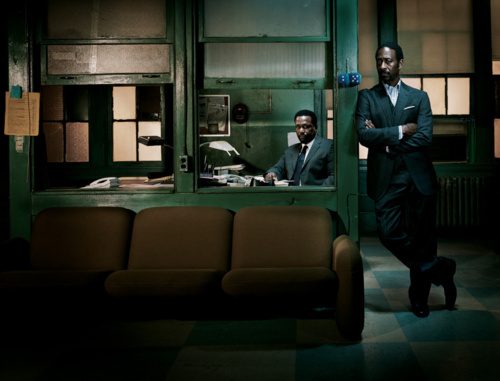
By freeing us to disapprove, it protects us from whatever else we may be feeling.
Torture is far more imaginative than erotic life.
Through revenge, fantasy in the adult who was once that child secures himself again; reinstates a lost safety net in the form of a triumph.
He needs to dominate where he was once dominated.
Desiring the parents, the forbidden pleasure of childhood, is replaced by not desiring the parents, the secret pleasure of adulthood.
What the child receives as enigmatic and always puzzling messages about his parents’ sexual relationship – the mime show of family life – the adolescent begins to uncover and reenact.
Adolescence – one of the greatest sociological inventions of the post-war period.
Sinfulness was the only way of being free to describe our most urgently forbidden pleasures.
What is transgressive about both acts (masturbation and suicide) is what might be called their selfishness, the ruthlessness of their satisfactions. In both acts what is dispensed with is the need for other people, either permanently or temporarily.
It is the sacrifice of self-recognition that sponsors forbidden pleasure.
The malign nostalgia of blame.
Are there stories we can tell about ourselves that are not about the past?
A capacity to be depressed means being able to recognize something that is true – that development involves loss and separation, that we hurt people we love and need – and that we are prepared to bear the grief and guilt. In this sense, depression makes us real. It deepens us.
Winnicott once referred to depression as “the fog over the battlefield.”
Appetite can destroy the best things about appetite.
We often have to invent an object of desire in order to invent something new about our desiring.
Adults use money to wish with.
The infantile pleasures of being loved, adored, stroked, held, cuddled, infinitely attended to and responded to, and thought about; of only sleeping, eating and playing, these are the truly satisfying pleasures.
The sane adult is always smuggling his childhood into the future, refashioning his childhood pleasures as legitimate adult interests.
The sane would not think it was worth dying for anyone’s sentences, including their own.
Intimacies by Adam Phillips and Leo Bersani (2008)
A blueprint for an unknowable future.
Psychoanalysis is about what two people can say to each other if they agree not to have sex.
Freud tried to describe, through the figure of psychoanalysis, a new way of being present to another person in a way that freed them – both the analyst and the patient – to think and feel and speak freely.
Psychoanalysis’ great achievement is its attempt to account for our inability to love others and ourselves
Jouissance accompanies the “unfathomable aggressivity” at the heart of both the other’s love for me and my love for the other.
Subjectivities are what power aims to produce.
Power aims to produce subjects defined (made visible and controlled) by particular desires.
Love, which we like to think of as a discovery, is inseparable from memory.
Freud: The discovery of an object is in fact a refinding of it. (3 essays)
There are two sexual objects: the woman who tends or the man who protects.
The person who represents those ideals is typically the object of an overestimation or idealization (the loved one carries the burden of being identified with two other love objects: the man’s mother and his own idealized infantile ego).
Lacan: love never makes anyone go out of himself.
We are at our most insist about boundaries when we sense their precariousness.
Knowing what one wants is an incitement to violence.
Freud, like Lacan, is struck by how difficult it is for the modern individual to maintain their appetite for appetite; that the acquisition of (modern) identity involves the sacrificing of desire, and identity without desire is a futile passion. The individual tries to fix himself in a definably boundaried and accountable self, while the desire that animates him lives by mobility.
Selfhood can only be constructed by the repudiation, censoring and punishing and trivializing of desire.
Wilde: careless habits of accuracy
The subject’s wish to know is a defense against what is unknowingly evolving as potential between them.
Where id was the ego shall be means whatever is strange about myself I must make familiar, recognition must replace bewilderment. Encouraged to love the very difference we are drawn to abolish is the double-bind of our modern sentimental education.
To be encouraged, to be educated, to be forced to drink what you would desire to spit out, is a form of torture. This is our preferred model of love relations, this loving of the other for their difference.
In shame we are (violently) separated from our preferred image of ourselves – in psychoanalytic language we betray or sacrifice our ego-ideal – and so to bear with our experience of shame, to go through it rather than to be paralyzed by mortification, is to yield to a radical reconfiguration of oneself.
Shame: I cannot see myself as I want to see myself or as I want others to see me.
Guilt: I do not really want to be what I feel I ought to be.
What we call love is our hatred of the future.
On Kindness by Adam Phillips and Barbara Taylor (2009)
The strength of our desires derive from our original helplessness and dependence.
Vulnerability is the medium of contact between us, what we most fundamentally recognize in each other.
The self in which a Stoic relied was communal.
Kindness: the ability to bear the vulnerability of others, and therefore of oneself.
The vulnerability we call desire is our shared biological inheritance.
A forensic fascination with his inner life.
Rousseau: our true self is not entirely within us.
When aggression isn’t envious rage or the revenge born of humiliation, it contains the wish for a more intimate exchange, a profounder, more unsettling kindness between people.
We must love, as Freud famously said, in order not to fall ill, and it is loving that makes us ill.
It is in their descriptions of childhood that modern adults have tended to play out their fears about themselves.
Psychoanalysis is an account of how and why modern people are so frightened of each other.
What Freud called defenses are the ways we protect ourselves from our desires, which are also our relations with others.
We need to be attentive when these strong feelings seem to be mutually exclusive, when love takes over so you can’t find the hate… we are always tempted to simplify our emotional lives in order to diminish the constant conflict we are in.
The ways we protect ourselves tend also to be the ways we imprison ourselves.
Every child wants to protect his parents from whatever makes them unhappy, and every child fails at this.
What Freud calls the “object’s attractions” are secondary. It is our desire and its satisfaction that attracts us, not its objects. It is our wanting that we are wedded to.
“In Winnicott’s view, once the child has felt and lived out his frustration with the real mother and father, and they have survived it – which might involve hating the child back but without in any way abandoning him – he can resume his relationship with them more realistically; he has added to the stock of available reality. If he had turned away from them at this point – retreated from real engagement, stopped making demands – or they had turned away from him, they would all have gone on living a fantasy life together. Real kindness, real fellow feeling, entails hating and being hated – that is, really feeling available frustrations – and through this, coming to a more realistic relationship. This, one might say, is a more robust version of kindness, a kindness made possible through frustration and hatred rather than a kindness organized to repudiate (or to disown) such feelings. Kindness of this variety allows for ambivalence and conflict while false, or magical, kindness distorts our perceptions of other people, often by sentimentalizing them, to avoid conflict. Sentimentality is cruelty by other means…
We have all been objects of hatred, but it is hatred denied or refused that for Winnicott is the problem for both mother and child. Right from the beginning we have been hated without knowing it; our mothers have had to hold this very difficult line between feeling this inevitable hatred and protecting the child from feeling too much of it. This is the trauma of motherhood, the containment of excessive hatred, the living out of excessive love. But the real bond, Winnicott insists, has to include hatred. Without felt hatred – without the acknowledgment of harm and frustration as integral to human relations -kindness becomes a protection racket, fellow feeling becomes a denial of the feelings actually held in common… Love freed from hatred kills fellow feeling. If there is a kindness instinct, it is going to have to take onboard ambivalence in human relations. It is kind to be able to bear conflict, in oneself and others; it is kind, to oneself and others, to forgo magic and sentimentality for reality. It is kind to see individuals as they are, rather than how we might want them to be; it is kind to care for people just as we find them.”
The kindness of the small child, we have said, emerges in the first instance as a reaction to his dependence. The child cares for his parents so that they can care for him; his “kindness” is a magical wishing-away of any anxiety or unhappiness that might interfere with parental solicitude. This magical kindness fails, and its failure is the child’s first trauma, one that he never entirely recovers from. But it is from this failure that genuine kindness emerges, the sort that can accommodate hostility and conflict while delivering the pleasures of mutual enjoyment and exchange. “Bad” parents (parents who fear ambivalence, and who want magical rescuing from it) can prevent this authentic kindness from developing; but so, too, can a society that denigrates kindness as weakness, and rewards unkindness. Real kindness is not a magic trick, a conjuring away of every hateful or aggressive impulse in favour of a selfless dedication to others. It is an opening up to others that – in Rousseau’s term – “enlarges” us, and so gratifies our profoundly social natures.
On Balance by Adam Phillips (2010)
The advantage of lying on the floor is that there is nowhere else to fall.
Punishment is despair about the rules, not their enforcement.
When Neil Diamond was asked about being rich he said, “You can’t eat two lunches.”
It is one’s appetite that links one to other people.
Whenever we have too much, it is because there is too little of what we need.
If sex didn’t have to satisfy us, it might give us more pleasure.
Literature is news that stays news.
We have relationships to discover what our needs might be.
Religion is for people who are afraid to grow up. (Freud)
Our excesses are the best clues we have to our own poverty, and our best way of concealing it from ourselves.
We have education so that we can listen to others without losing our temper.
Some pleasures don’t make us happy, and some pains do.
Psychoanalysis is that it is the one place left in our culture where you can be wholeheartedly unhappy.
Delinquent behaviour is the unconscious attempt to find the rules that really matter.
Only by being really difficult can the child discover whether the parents are worth having.
The map tells us that we are already lost.
“I won’t be punished,” is both a fear and a wish.
Our solutions are redescriptions of our problems.
A souvenir celebrates the destruction of memory in the guise of its preservation.
The erotic is always appearance as disappearance.
Our disillusionments must be the key to our tastes.
We might ask of any object we value: what does it help us forget?
We suffer most from the ways we have of avoiding our suffering.
Hopefully what we learn from our mistakes is that we shall go on making them.
Missing Out (2012)
Not having children ensures they will never leave home.
Larkin: depression is to me as daffodils were to Wordsworth.
We live as if we knew more about the experiences we don’t have than the ones we do. (And sometimes we need to be able to do this in order to free ourselves.)
The authority of inexperience.
The conviction we gain from not doing things.
The courage of one’s naivety.
The neurotic keeps arriving at the place he is trying to escape from.
Deprivation makes us imagine.
The certainty of knowing what one is escaping from is one of the misrecognitions required to construct an acceptable image of oneself.
A good question to ask any text: what does it get you out of?
What can I make it mean in order to free me of a previously confining belief or desire?
Those who cannot pretend to know everything about the past are doomed to repeat it.
James Richardson: Nothing important comes with instructions.
John Searle: Governments have a monopoly on organized violence.
Our frustration is the precondition for our satisfaction.
Real feeling is replaced by defenses against it, and these defenses seem to be what one is really feeling.
No child ever recovers from not having cured his parents.
What do books learn from our reading them?
The will to understand-our second nature-is sometimes a distraction from, or an evasion of, something more valuable or even more pleasurable.
The wish to be understood may be our most vengeful demand, the way we hang on, as adults, to our grudge against our mothers; the way we never let our mothers off the hook for their not meeting our every need.
Wanting to be understood can be our most violent form of nostalgia.
When Ashberry was asked in an interview why his poetry was so difficult, he replied that when you talk to other people they eventually lose interest, but that when you talk to yourself, people want to listen in.
Abandonment equals lack of knowledge. Overinterpretation: betrays an anxiety about not being close enough to the one who knows (well being/survival depends on closeness, and closeness to knowledge).
Knowledge, Freud tells us, is of absence; it is the way we measure distance.
Knowing is a desperate attempt to conceal that others exist, separate others whom we need.
Psychoanalysis is an opportunity to recover the freedom not to know or be known, and so to find out what people might do together instead. (p. 75)
Where we are helpless we will become curious.
Greed is despair about pleasure.
We have to survive our appetites by making people co-operate with our wanting.
Because we are nothing special… it is the work of culture (and our parents) to make us feel special.
We only want what isn’t there.
Our solutions tell us what our problems are.
In Freud’s story our possibilities for satisfaction depend upon our capacity for frustration; if we can’t let ourselves feel our frustration, we can’t get a sense of what we want or give us pleasure.
We have to resist our wanting being stolen from us before we have realized it.
Frustration is optimistic, a form of faith, it believes that what is wanted is available.
We would rather destroy everything than let other people change us, so strong is our memory of how changed we were at the very beginning of our lives by certain other people; people who could change our misery into bliss, as if by magic, and which we were unable to do for ourselves (all we could do was signal our distress and hope someone got the point).
Knowing what one wants is risk management, a way of not exposing ourselves to change.
The idea of the self as self-cure for our first helplessness in the face of our need.
Addiction is frustration too simply met.
The first audience is the family.
You can’t have a desire without an inspiring sense of lack (or frustration) but if it is our first nature to need, it is our second nature to obscure our frustration (hide it, turn it into pleasure, idealize it, project it). Many of our satisfactions are forms of our frustrations.
Symptoms are always a form of self-cure… the alcoholic is suffering from whatever conflict alcohol was initially a solution to, and then the solution becomes the problem. The real question is not, how can someone stop drinking, but rather, what was the alcohol a self-cure for in the first place? The problem is cast into oblivion by the solution.
Satisfaction happens twice – first as wish and fantasy, and then in reality.
Freud described how much work we do to ensure that our satisfaction is no surprise.
When you already know what satisfaction is, how can you possibly what out what it is like?
Fantasies of satisfaction are attacks on desire, defenses against desiring.
Why is satisfaction always linked with revenge, and revenge to certainty (revenge makes wanting definitive)?
For Lacan giving up on one’s desire is the source of guilt.
The tragic hero cedes his desire by turning it into a desire for knowledge.
You can’t have an entirely private sense of humour.
Unforbidden Pleasures (2016)
All our ideals are restrictive, that is their point and purpose.
To forbid something is to make it unforgettable.
We are taught to remember everything except our pleasures.
Significant changes in personal and cultural history always involves the redescription of previously forbidden desires.
Once we start having it both ways, we can see how many ways there can be.
Addiction is always the ongoing attempt to survive the mothering to which one had to submit.
Originally there were other people we wanted to murder; but this was too dangerous so we murder ourselves through self reproach.
The overcompliant, obedient child has the pleasure of short-term safety. The non-compliant child is free to find out what the mother’s range might be, and, by the same token, what his range might be. The compliant child runs the risk of becoming a rebel; the non-compliant child runs the risk of wanting a permanent state of revolution. The compliant child will crave ritual and routine; the non-compliant child will want nothing but the shock of the new (anger is hope: hope that things can be different; that frustration can be modified). The non-compliant child is always wanting to extend her repertoire; the compliant child is wanting more of the same.
Guilt is not necessarily a good clue to what one values; it is only a good clue to what (or whom) one fears. Not doing something because one feels guilty if one does it is not necessarily a good reason not to do it. Morality born of intimidation is immoral. Psychoanalysis was Freud’s attempt to say something new about the police and the judiciary, about the internal legal system.
Safety (and security) is preferred to desire. But this supposed safety, at least in Freud’s version, comes at considerable cost; at the cost of being turned into an object. It depends upon our being made to feel that we are the kind of creatures that need an excessive amount of critical and condemnatory scrutiny. We must be packed with forbidden desires, if so much censorship and judgment is required. We are encouraged to believe, by all this censorship and judgment, that forbidden, transgressive pleasures are what we really crave. That really, essentially, deep down, we are criminals, we need to be protected primarily from ourselves, from our wayward desires.
Marion Milner: part of the middle or independent group of Brit psychoanalysts that is interested in the child’s capacity for absorption. The unconscious is sensitive to the sameness between things, between self and objects/others (finding ‘the familiar in the unfamiliar’). The recovery of oneself as part of one’s world, rather than an exile from it. Identification (able to withstand a temporary loss of self) arrives at “an aesthetic moment” “when the spectator is at one with a work of art.” She poses this as a model for human relationships, it is the way “we find new objects.” It is the loss of a child’s capacity to be absorbed that modern people suffer from.
